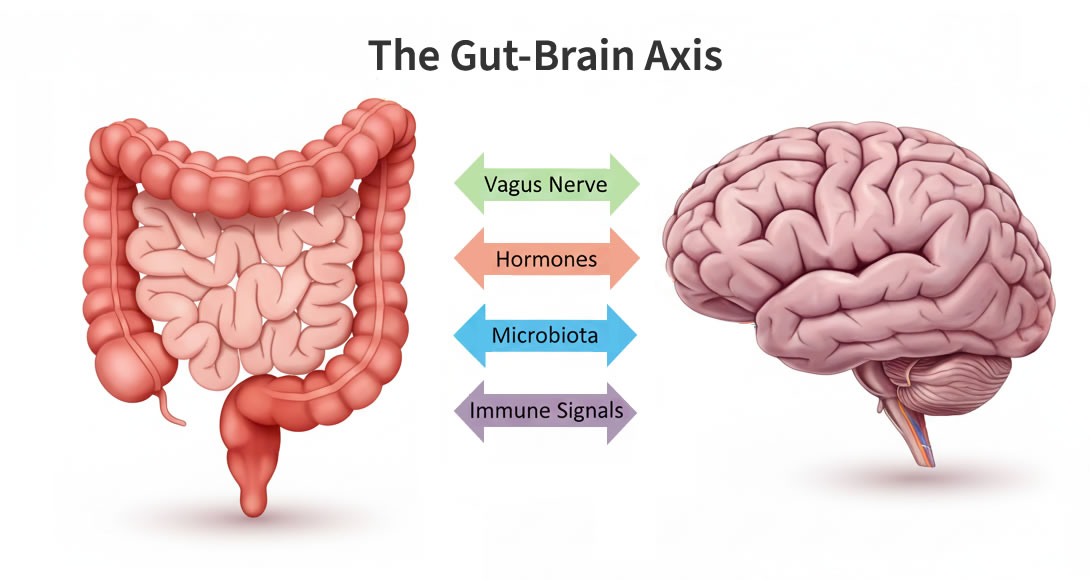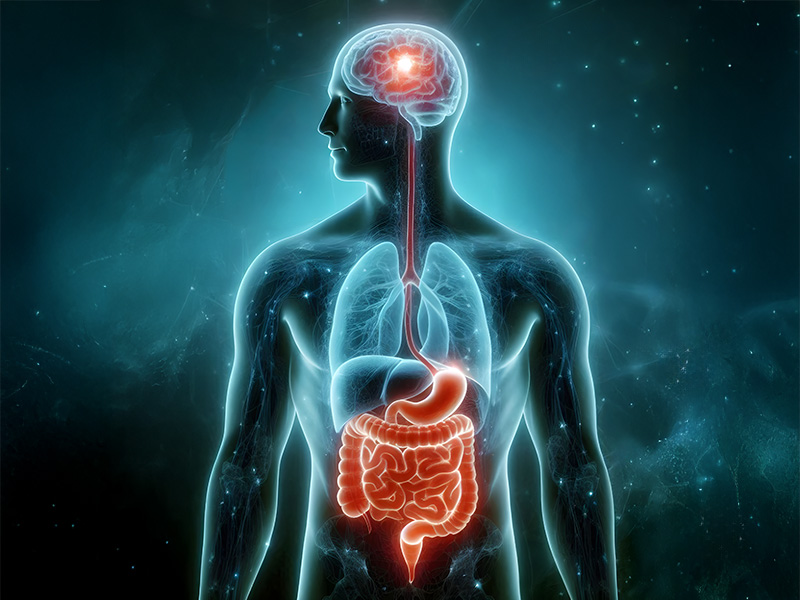What is the Gut-Brain Connection?
If you've ever felt a "gut feeling" about something or had butterflies in your stomach before a big event, you've experienced the gut-brain connection firsthand. This isn't just a metaphor—it's a complex, two-way communication network that links your digestive system and your brain.
This communication system is also known as the gut-brain axis. It involves a constant exchange of signals between your central nervous system (your brain) and your enteric nervous system (the extensive network of nerves within your gut). Modern science is beginning to refer to the gut as your "second brain" because of the millions of neurons it contains [1].

How Does the Gut-Brain Axis Work?
The gut-brain connection operates through several key pathways:
- The Vagus Nerve: This is the body's main communication highway between the gut and the brain. The vagus nerve sends constant signals about the state of your gut, influencing everything from mood to stress responses [2].
- The Microbiome: Your gut is home to trillions of microorganisms, including bacteria, fungi, and viruses, which make up your gut microbiome. These microbes are a powerful influence, producing hundreds of neuroactive compounds that your brain uses, including crucial neurotransmitters like serotonin and GABA, which regulate mood and anxiety [3]. In fact, over 90% of the body's serotonin is produced in the gut.
- The Immune System: A significant portion of your immune system resides in your gut. Gut microbes can influence immune cells and inflammation levels throughout the body. Chronic inflammation is increasingly linked to mood disorders and other health issues.
Why a Healthy Gut is Key for Your Mental Health
Research has shown that a healthy, balanced gut can directly contribute to better mental well-being. A diverse and thriving microbiome supports the production of key neurotransmitters and helps reduce systemic inflammation.
Conversely, an imbalanced microbiome (known as dysbiosis) can be a factor in conditions like anxiety, depression, and even neurological disorders [4]. This is why people often report digestive issues alongside feelings of stress or anxiety.
How to Improve Your Gut-Brain Connection
The great news is that you have the power to positively influence your gut health through simple, daily habits.
1. Focus on a Gut-Friendly Diet
The foods you eat directly impact your microbiome.
- Eat More Fiber: Fiber is a prebiotic, meaning it's the food that nourishes your beneficial gut bacteria. Load up on whole grains, legumes, oats, and vegetables like garlic, onions, and asparagus [5].
- Consume Probiotic-Rich Foods: These foods introduce beneficial bacteria directly into your gut.
- Yogurt (with live cultures)
- Kefir
- Sauerkraut
- Kimchi
- Kombucha
- Include Omega-3s: Foods rich in Omega-3 fatty acids, like salmon, walnuts, and flaxseeds, have anti-inflammatory properties that benefit both your gut and brain [6].
- Limit Processed Foods: Highly processed foods, excessive sugar, and artificial sweeteners can disrupt your gut's microbial balance.
2. Manage Your Stress Levels
The gut-brain axis is a two-way street, and chronic stress is a major factor in gut dysfunction. Stress can alter your gut microbiome, increase gut permeability, and slow down digestion [1].
- Practice Mindfulness: Activities like meditation, deep breathing, and yoga can help calm your nervous system.
- Get Regular Exercise: Physical activity is proven to reduce stress and can also positively impact your gut bacteria.
- Prioritize Sleep: Poor sleep can disrupt the gut-brain connection, so aim for 7-9 hours per night.
Conclusion: Your Journey to a Happier Gut and Mind
The connection between your gut and your brain is undeniable and powerful. By making small, consistent changes to your diet and lifestyle, you can cultivate a healthy gut microbiome that supports not only your physical digestion but also your mental clarity and emotional well-being.
Your gut truly is your second brain, and it's time to start taking care of it.
Citations
- Medical News Today. "The gut-brain axis: What's it all about?" Source
- Frontiers in Psychiatry. "Vagus Nerve as Modulator of the Brain–Gut Axis in Psychiatric and Inflammatory Disorders." Source
- Harvard Medical School. "The gut-brain axis." Source
- Psychology Today. "The Best and Worst Foods for Gut-Brain Health." Source
- National Institutes of Health (NIH). "The Gut-Brain Connection." Source
- Harvard T.H. Chan School of Public Health. "Diet Review: Omega-3 Fatty Acids." Source



